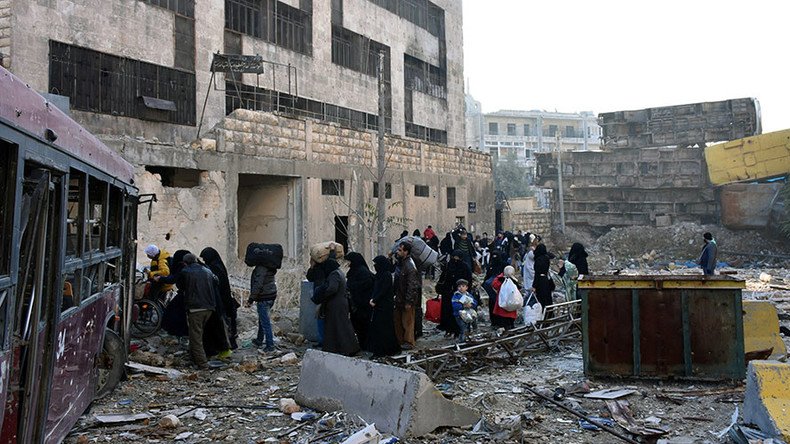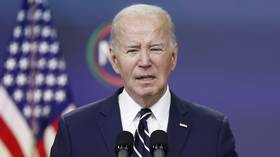US defeat in Syria would mark 'end of America's unilateral moment'

Many think the global situation will change as new leadership arrives in Washington, but that is not necessarily true. In fact, US foreign policy rarely changes with new presidents, independent researcher and writer, Soraya Sepahpour-Ulrich, told RT.
With almost 70 percent of rebel-held territory in the Syrian city of Aleppo liberated by government forces, according to Russia's Defense Ministry, many are wondering what will happen next to embattled Syria, pulled as it is in a tug-of-war between competing forces.
Syrian Army retakes 70% of E. Aleppo, evacuates over 1,200 civilians – Russian military https://t.co/oftWb7vNEz
— RT (@RT_com) 7 декабря 2016 г.
RT: The militants in Aleppo have already lost almost 70 percent of their territory. Is that battle for Aleppo a done deal now? Or is there any hope left for the militants?
Soraya Sepahpour-Ulrich: I would love to say that it is a done deal, but it is not done until it’s done until it’s 100 percent. From the way I see it, from what I read here, from what I listen to, America and its allies will not give up – they have not given up. One may be under the impression that things will change as different presidents take office, or they reside in the White House, but that is not the case. US foreign policy doesn’t change with presidents, regardless what they say during their campaigns. Unfortunately, the battle for Aleppo will not be over because America and its allies have not achieved their objectives. As long as they’ve not done that, they are going to continue one way or another. Regrettably, that is what I think, and I hope that I’m wrong.
There is no doubt whatsoever that Western governments have had a ludicrously one-sided view of the terrible conflict, the terrible civil war in Syria, and have essentially been backing any force which is fighting the government of President Assad, no matter how Islamist, or how extremist that force might be. - former British diplomat Craig Murray to RT.
RT: Is any support for 'moderate' opposition forces likely to just prolong the suffering of civilians?
SSU: Most definitely, but I think America has reached the point where it doesn’t even know who is a so-called 'moderate' terrorist or the actual hard-core terrorist. America no longer distinguishes between them. And its allies cannot either. And the allies I’m talking about are the regional Arab states. Of course, Europe has a hand in it, and Israel continues to strike inside sovereign Syria. So the situation is only going to escalate; the more desperate they get, the more reactionary they are getting. And while they may be running out of 'moderate' terrorists, or maybe the 'moderate' terrorists want to stop the fight, the plans that are still on the table. America will not concede, nor will its allies, in Syria until they’re virtually kicked out.
LAVROV: Americans currently working on alternative plan for Aleppo, Wednesday consultations canceled at this point https://t.co/wzv1ykQy9Zpic.twitter.com/qBDpD2USAJ
— RT (@RT_com) 6 декабря 2016 г.
RT: On Wednesday, the leaders of Canada, France, Germany, Italy, the UK and the US issued a joint statement condemning the actions of the Syrian government and its allies - of course, Russia being considered one of the allies. What do you think of the timing of that?
SSU: It is mind-boggling that the foreign-backed terrorists in Syria are under reprieve, because President Assad is fighting them with help from Russia, Iran, and even China is so much involved now. The so-called free world – the world that is fighting terrorists supposedly is outraged – that the terrorists are being beaten. It is mind-boggling to anybody with the smallest bit of common sense. It also shows the fear that the so-called free world is feeling, because when President Assad of Syria - along with his partners in this fight - do prevail, that means the end of American hegemony or the end of the international system as we know it. It would no longer be America demanding or imposing its will on the nations because it is going to fail eventually at a huge cost, I'm afraid. But it is the end of the unilateral moment with the US and the international system will change. That is why a lot of allies who are complicit in these horrendous acts of terror, war, and genocide are panicking because their time is up, as well.
Committing the Same Mistakes
The West has sought change in secular regimes in Iraq, Libya, and Syria, harming civilians and supporting so-called moderate rebels, says Mischael Modrikamen, co-founder, and leader of the Belgian People's Party.
Those rebels turned out to be Islamists worse than the regime in place, he added.
RT: The militants in Aleppo have already lost almost 70 percent of their territory, yet it hasn't stopped their aggressiveness as they have stepped up their counter-attacks. Do you think they still have a chance of repelling the government forces'?
Mischael Modrikamen: I am not privy to the exact situation on the ground, but I can see that we have a real game changer for months now, where the official Syrian regime - helped by Russia - is clearly winning this war. I think that in the West, in the US we should take into consideration this reality and adapt our vision, our objective to this new situation indeed.
MORE: Deceased serviceman, colonel Ruslan Galitsky, was working with group of Russian military counselors - MoD https://t.co/EaMYqOlowf
— RT (@RT_com) 7 декабря 2016 г.
RT: A joint statement was released yesterday by the leaders of Canada, France, Germany, Italy, the UK and the US, where they condemned the actions of the Syrian government and its supporters. What do you think of the timing of this report was issued?
MM: I think it is unfortunate because they are committing the same mistake that we have committed in the West for the last 10-15 years. We have sought change in secular regimes in Iraq, Libya, and Syria with the result that we see today. We have harmed, we have supported so-called moderate rebels, armed them, and we have seen that these rebels turned out to be Islamists worse than the regime in place.
Unfortunately, this kind of statement does not help and do not take into consideration the reality on the ground. We should find the objective. Syria is a very complex situation with a lot of interests involved obviously. It is difficult to know, or to define what we really want. But we can at least define what we really do not want. And we don’t want an ISIS stronghold; we don’t want an Al-Qaeda stronghold; we don’t want even a stronghold for so-called 'moderates' that turned to be ultimately fanatics.
I think that Europe and the US should adapt to this reality and should change the strategic goals.
The statements, views and opinions expressed in this column are solely those of the author and do not necessarily represent those of RT.












